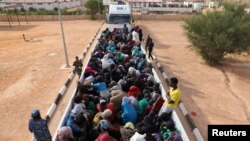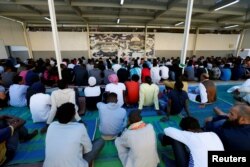The U.N. refugee agency said on Friday it was gravely concerned about a deterioration in conditions for migrants held in Libyan detention centers that had led to riots and hunger strikes.
Many migrants are taken to the centers after being intercepted by Libya's EU-backed coast guard as they try to reach Europe by sea, a policy that has been criticized by human rights groups.
An estimated 8,000 migrants are currently held in 18 detention centers linked to the internationally recognized government in Tripoli, according to UNHCR.
Those detained make up a small fraction of the several hundred thousand migrants residing in Libya or passing through the North African country.
Humanitarian workers have limited access to the centers.
"In recent weeks, UNHCR has witnessed a critical worsening in conditions in detention centers, due to the increasing overcrowding and lack of basic living standards," the agency said in a statement.
"As a consequence, riots and hunger strikes by refugees inside detention centers are taking place, demanding a resolution to their bleak living conditions.
"This has led to a number of serious security incidents, where UNHCR front line staff have been placed at physical risk."
Libyan officials have blamed poor conditions at detention centers on a lack of resources, and have said migrants are detained for their own protection.
Departures of mainly sub-Saharan African migrants from Libya to Italy peaked between 2014 and 2017 as the country slid further into turmoil following a NATO-backed uprising seven years ago.
Last summer smuggler networks were disrupted under heavy pressure from Italy, and Libya's coast guard stepped up interceptions.
So far this year, 12,174 migrants have landed in Italy from Libya — nearly 87 percent fewer than during the same period in 2017, according to Italian interior ministry statistics.
There are nearly 55,000 refugees and asylum-seekers registered in Libya, where they face limited chances of resettlement, according to UNHCR.






